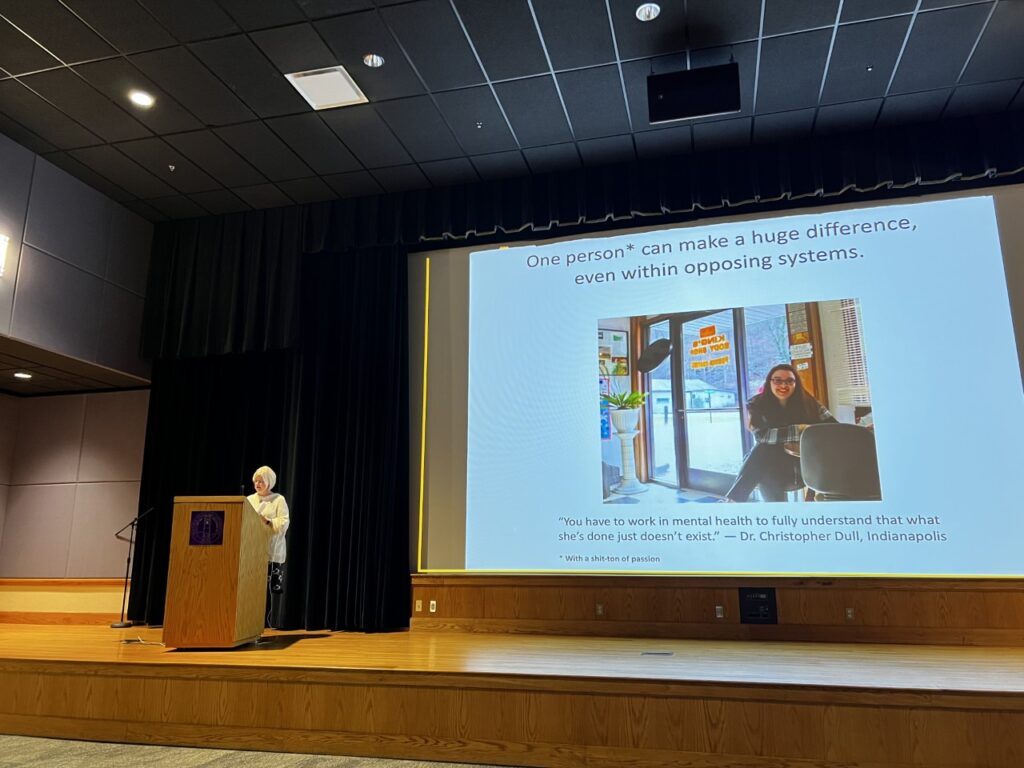“If somebody tells me a story and it makes the hair stand up on my neck, then chances are it’s a good story. If I’m telling my husband about something I learn and my voice chokes up, I follow what moves me,” Macy says.

Following what moves her is something that Beth Macy has been doing for over 25 years now. She spoke at the 21st Spring Literary Festival, hosted by Western’s English Department about her journey as an author and journalist.
Macy’s latest novel “Raising Lazarus” continues the story of America’s overdose epidemic. Macy is a storyteller, and she has dedicated her life to seeking out the people whose stories need to be heard.
Macy was raised by blue-collar parents, and she was the first in her family to get a college education. Alcoholism affected generations of her family, so addiction is something that hits incredibly close to home for her.
Her journey reporting about addiction began with 19-year-old, Spencer Mumpower who was incarcerated for selling drugs in his private school. Mumpower achieved sobriety through a drug court program. His story of rehabilitation moved Macy and showed her that people have the capacity to change. Mumpower’s story is relayed in Macy’s 2018 novel, “Dopesick.”
Macy’s Literary Festival presentation in the UC Theater drew a crowd. She told different stories from her years of research. Her heart for helping people in desperate situations was apparent as she shared stories of their interactions. Every person she has encountered on her journey is important to her. She remembers their names and their stories.
“I keep up with people, that’s just something I do,” Macy said.
One thing that stood out as Macy discussed her journey was the throughline of women being present and taking action.
“A lot of the innovators were women,” Macy said.
She met women running underground needle exchange programs before legislation allowed because they saw the need in their community. She discussed a woman who was changing the way her community’s rehabilitation system worked. She met mothers who protested in outrage because politicians weren’t acting when millions of people, like their own children, were dying.
“Women are the leaders in this because they take care of families, and we need to start listening to them more. It’s really, really important and I just think women get shit done,” Macy said.
In her newest novel “Raising Lazarus,” Macy talks about the dirty work that goes into rehabilitating people with addictions. She got emotional as she told the audience about watching a woman wash the maggot infested legs of an addicted man.
Encounters like this inspired the name of Macy’s book. In the Bible, Jesus brought Lazarus back to life after he had been dead for four days. Lazarus’ sisters worried about the smell. Jesus commanded them to roll the tomb stone away and remove Lazarus’ graveclothes. His sisters did the dirty work and Lazarus was returned to life. This is similar to the work done to rehabilitate the addicted.
Macy tells the stories of women taking initiative with a powerful, feminine approach. She talked about their tears and their humanity. She talked about their moments of weakness and vulnerability. She told us about her own moments of weakness and doubt throughout the difficult journey of writing about addiction. She opened up about seeking therapy after finishing “Dopesick.” She didn’t know if she could write about the topic again. Despite panic attacks and tearful phone calls with friends, she persisted because she knew the importance of telling those stories.
Macy’s words are raw and honest. She lets these stories soak into her being and affect her deeply. Her reporting and storytelling is very intimate.
One of the slides in her presentation said, “one person can make a huge difference, even within opposing systems.”
As the evening went on, Macy discussed communing with addicts and standing toe to toe with big pharmaceutical company lawyers. The work she is doing with her books is making a huge difference in a system that is opposing change.
As she told for many people and communities, she is a person making a huge difference.
Related stories: 2023 LitFest continues tradition of inspiring students and locals


